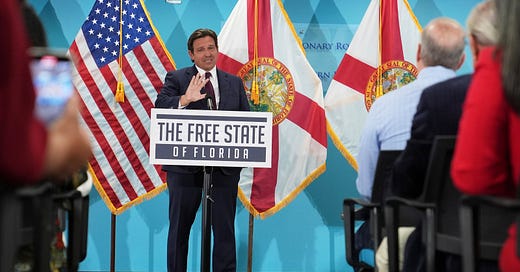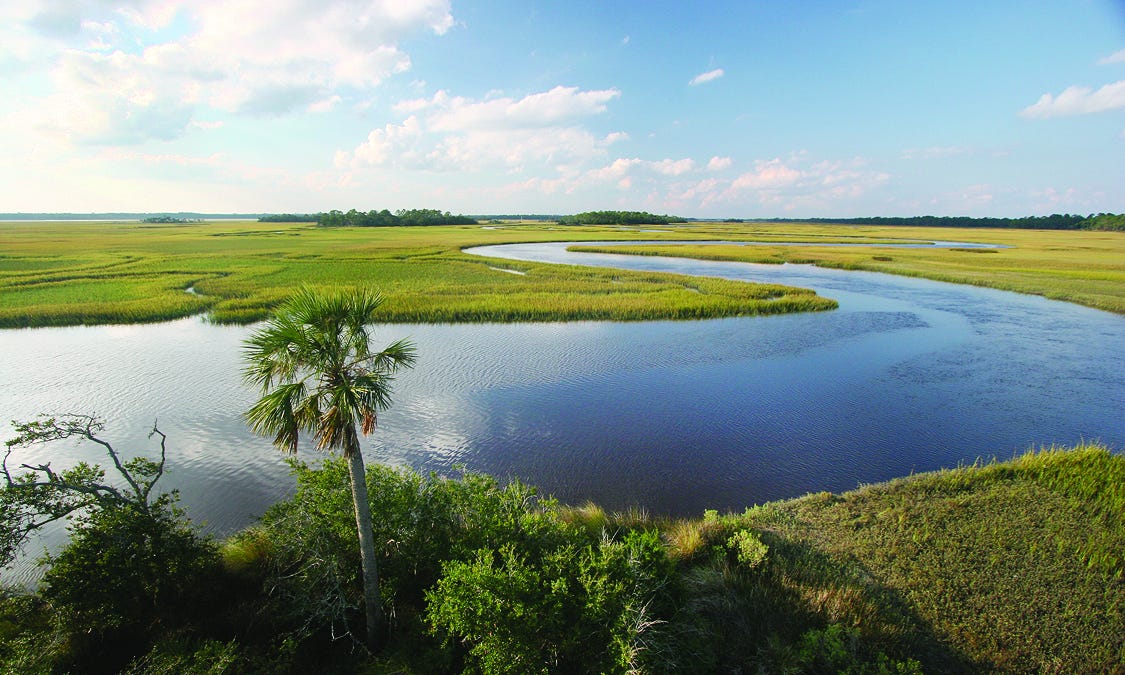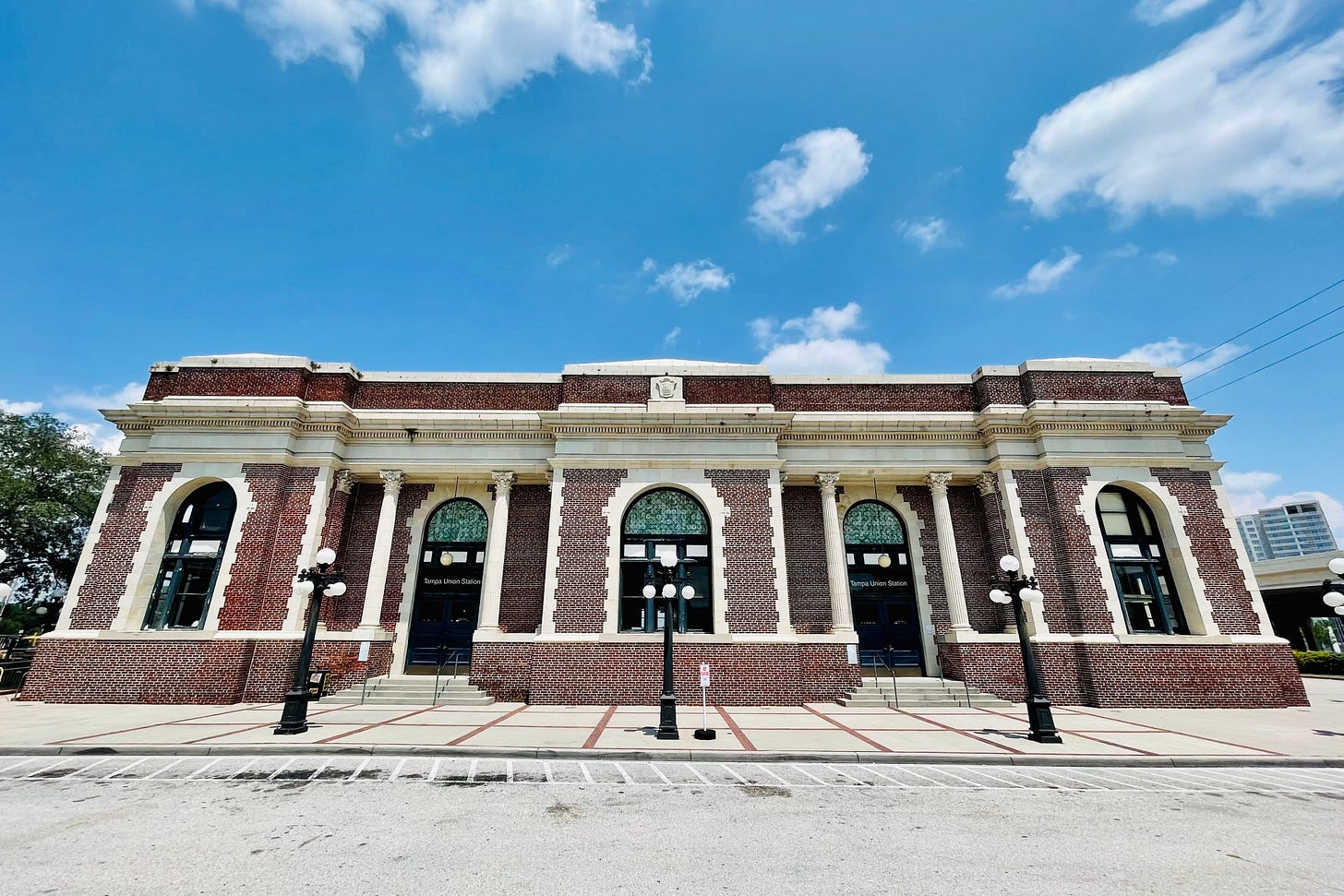Florida Bans Fluoride from Public Water & Lawmakers Defy DeSantis on Property Tax Cuts
May 19, 2025 - This Week's News from Central Florida
Welcome to this week’s edition of the Central Florida Times, an independent, reader-supported newsletter focusing on the Sunshine State. These are the most important stories you need to know from across Central Florida. To never miss an update, subscribe here:
Here’s the latest from Central Florida…
Florida Bans Fluoride from Public Water
Governor Ron DeSantis on Thursday signed a new law that will prevent Florida’s local governments from adding fluoride to public water systems, a decision drawing both praise and criticism across the state. The state is now the second in the nation, after Utah, to enact such a prohibition. The measure, which takes effect July 1, doesn’t mention fluoride by name. Instead, it bars municipalities from adding substances to water unless they directly improve its quality or reduce contaminants. The move effectively ends decades of community water fluoridation used to combat tooth decay. DeSantis defended the bill as a matter of personal choice, saying, “You should be able to make decisions on the basis of informed consent. Forcing this in the water supply is trying to take that away from people who may want to make a different decision.” Florida Surgeon General Joseph Ladapo has also campaigned against fluoridation, citing disputed research on fluoride’s potential risks, such as neurodevelopmental deficiencies, neurobehavioral problems, and skeletal fluorosis. The Florida Department of Health announced guidance in November 2024 to recommend against community water fluoridation due to these exposure concerns. Meanwhile, the move has drawn sharp criticism from health organizations, including the CDC and the American Dental Association, who warn that ending fluoridation could lead to increased tooth decay, especially among children and low-income families.
About 100 water systems across Florida currently add fluoride, including Orange, Osceola, Hillsborough, and Pinellas counties and cities like Orlando, Winter Park, Kissimmee, Clearwater, St. Petersburg, and Tampa. However, at least 14 cities in the state have stopped adding fluoride this year, affecting nearly 4 million people. Earlier in May, the Miami-Dade County Commission overrode the mayor's veto that would have kept fluoride in the public drinking supply, impacting 2.8 million people alone. Residents will still receive some natural fluoride from water, and it will remain available in products like toothpaste, mouthwash, and fluoride applications by dental providers.
House Committee Defies DeSantis on Property Tax Cuts
A Florida House panel is forging ahead with ambitious property tax reforms, despite mounting friction with Gov. Ron DeSantis and signs of discord within the GOP. The Select Committee on Property Taxes met twice last week, pressing forward with plans to place tax-cut proposals on the 2026 ballot, even as the state budget remains unresolved. “What we've seen over the last five years is revenue increasing, increasing, increasing,” said Rep. Toby Overdorf (R-Port St. Lucie), the committee’s co-chair. “I would challenge you to go out and look at municipalities that have cut their mill rate.” While Overdorf acknowledged potential budgetary hardship on local governments, he emphasized reining in spending to return funds to residents and small businesses. Proposals floated so far include a $500,000 homestead exemption, foreclosure protections for missed tax payments, and targeted tax breaks for seniors. DeSantis, meanwhile, has been critical of the property tax committee, referring to it as a “dog and pony” show. He rejected the panel’s invitation to discuss his own $5 billion rebate plan, which would send $1,000 checks to homeowners. House Speaker Danny Perez (R-Miami) has dismissed the governor’s plan, stating that it wouldn't lower rates and resolve the property tax problem. The House committee of nearly three dozen lawmakers will continue meeting, with a "listening tour" planned statewide, aiming to craft a proposal for voter approval in 2026.
DeSantis Signs Sweeping Farm Bill Addressing Agriculture, Plant-Based Food, ESG
Governor Ron DeSantis signed Senate Bill 700 on Thursday, enacting what state leaders describe as the most comprehensive farm bill in Florida’s history. The sweeping legislation introduces a range of new rules aimed at strengthening the state’s $11 billion agriculture sector, which supports 140,000 jobs and 45,000 farms across 10 million acres. DeSantis touted the legislation as a historic step to safeguard Florida’s agricultural industry. A central provision of the bill prohibits financial institutions from discriminating against farmers based on environmental, social, and governance (ESG) criteria, a move the governor and supporters say will protect agricultural producers from politically motivated lending practices. The measure also expands disaster recovery aid for farmers, stricter food labeling for plant-based products, and protections for school-based agricultural education programs like 4-H and FFA. Specifically, for alternative animal products such as those derived from soy or almonds, these items can no longer be labeled as “milk” or “meat,” in an effort to establish fairer competition for farmers in marketing. SB 700 further streamlines concealed carry firearm permits for those with military backgrounds, bars local governments from restricting verified farmworker housing, and mandates legal employment status for agricultural labor. It also restricts drone use over state hunting land or farmland, blocks foreign donations to charities from countries of concern (China, Cuba, Iran, Venezuela, North Korea, and Syria), and allows for the conversion of solar fields back to agricultural production. The law takes effect July 1.
Orange County Cancels $472M in Medical Debt for Over 310K Residents
More than 310,000 Orange County residents recently received unexpected letters informing them that long-standing medical debts had been erased. The debt relief, totaling around $472.5 million, was made possible through a $4.5 million partnership between Orange County and the nonprofit Undue Medical Debt (formerly known as R.I.P. Medical Debt). Using funds from the American Rescue Plan Act, the county collaborated with healthcare providers and debt collectors to identify eligible individuals. Most recipients had incomes below 400% of the federal poverty level or held medical debt exceeding 5% of their household income. On average, $1,728 in debt was cleared per person. The organization did not require individuals to apply. Instead, it purchased qualifying debt in bulk at a steep discount and forgave it outright. Recipients were assured in writing: “You no longer have any obligation to pay this debt to anyone, at any future time.” Orange County officials had launched a website to help residents understand the program and avoid scams. Mayor Jerry Demings praised the initiative as a meaningful step toward improving residents’ quality of life and financial stability. Orange County is the first in Florida to use American Rescue Plan Act funds for such a program, joining other cities and states nationwide.
FWC Releases Guidelines for Florida’s First Bear Hunt Since 2015, Sparking Statewide Protests
Florida may soon resume bear hunting for the first time since 2015, with wildlife officials releasing draft guidelines that have reignited fierce debate among wildlife advocates and hunters across the state. The Florida Fish and Wildlife Conservation Commission (FWC) unveiled the proposed framework last week that could pave the way for an annual black bear hunt, beginning as early as this December. Proponents argue that the growing bear population—estimated at over 4,000—now requires active management, citing concerns about bears moving into neighborhoods as suitable habitat becomes scarce. Supporters also point to a recent fatal bear attack in Collier County as evidence of increasing human-bear conflicts. “Through a conservative, well-regulated hunt,” the state can balance human-bear interactions and ecological needs, according to a memo by the FWC’s hunting director. The proposed rules outline limited hunting zones where bear populations exceed 200, with permits issued through a lottery system and a one-bear-per-hunter cap. The guidance also authorizes the use of dogs and bait stations—measures that sparked immediate backlash from conservation groups. Critics are also alarmed by the removal of mandatory check-in stations for harvested bears, which were in place during the controversial hunt a decade ago that was cut short after 298 bears were killed in two days. Conservationists and animal welfare groups organized protests in at least 13 cities across the state this past weekend, arguing the hunt favors trophy hunters and could jeopardize a species that was listed as threatened until 2012. FWC commissioners are set to discuss the proposal in Ocala this week, on May 21, though a final decision isn’t expected until August.
DeSantis Receives 54 Bills, Including Changes to School Start Times and Demolition of Historic Buildings
Gov. Ron DeSantis is now reviewing 54 bills sent by the Florida Legislature on Friday, covering a range of issues from school schedules to public safety. Among the measures is SB 296, which would ease a 2023 law requiring high schools to begin no earlier than 8:30 AM. Originally set to take effect in 2026, the mandate faced pushback from school districts citing logistical challenges due to transportation and staffing shortages. If approved, the new bill gives school districts more flexibility on high school start times and allows exemptions if a report is submitted to the Department of Education explaining barriers to compliance. Also heading to the governor is HB 593, targeting “dangerous dogs.” The bill would require owners of aggressive animals to implant microchips and carry liability insurance. Removing a chip would be a third-degree felony. Other proposals include stiffer penalties for excessive speeding, creating a third-degree murder charge for drug-related deaths involving minors, and increasing consequences for demolishing historic buildings. SB 1202 would extend health coverage to firefighters disabled during training. Another measure calls for the annual observance of “Holocaust Remembrance Day” in Florida schools.
Proposed Northeast Florida Land Swap Raises Alarms
As outrage over last year’s proposed plans to develop Florida’s state parks has subsided, a fresh controversy is brewing and sparking anxiety—this time in northeast Florida. A surprise proposal by the Florida Department of Environmental Protection (FDEP) to exchange 600 acres of the Guana River Wildlife Management Area in St. Johns County for more than 3,000 acres scattered across four other counties has residents and conservationists raising red flags. The plan, first revealed on a Department of Environmental Protection agenda posted last week, involves The Upland LLC, a private firm formed only in February. The lack of clarity about the company’s plans, paired with vague assurances that “a majority of the wetland habitats will be avoided,” has stirred concerns of another behind-the-scenes land deal. It is believed that the land would be developed for housing, based on other similar proposals to acquire property in the area. Protests are already being planned as opponents express unease about losing a biodiverse habitat and threatening water quality in Guana Lake. Critics say the proposal exploits a legal mechanism never intended for this type of deal that would relinquish vital conservation land, while key leadership changes, including a sudden resignation from the state’s top public lands official, add to growing worry. The state’s Acquisition and Restoration Council will consider the proposal on May 21, with a final decision expected from the Governor and Cabinet in June.
Phase 2 of Downtown Tampa’s Water Street: More Retail, Residences, & Green Space
Construction is well underway for the second phase of Tampa’s Water Street development, a 56-acre urban district transforming downtown. Once home to vacant land and surface parking lots, the area has grown into a vibrant neighborhood near Amalie Arena and Channelside since development began in 2019. Phase one introduced three apartment buildings, three hotels, office space, and a vibrant mix of restaurants and retailers. Now, phase two will expand Water Street northward, adding six blocks over time and introducing Tampa’s tallest residential condominium to the live-work-play neighborhood. Unlike the first phase, which saw 10 buildings rise simultaneously, the next stretch will progress two projects at a time. Plans include more shops, housing, added parking, and an entertainment destination featuring a hotel, parking garage, and retail spaces. The development team is applying lessons from the first phase to improve the experiences of residents and visitors, incorporating more parking and green spaces. A new central park will also serve as the anchor for this phase, eventually hosting open-air markets, outdoor concerts, and other recreational activities. Road and utility infrastructure work is expected to be nearing completion, with the full buildout expected to take up to a decade.
St. Petersburg Cancels Plans for Downtown Moffitt Cancer Center Campus
A plan to bring a Moffitt Cancer Center campus to downtown St. Petersburg has been replaced with two 31-story luxury apartment towers. Last week, the City Council voted unanimously to approve the major housing development at 800 Second Ave. S., land once reserved for the medical facility. The project will feature 824 market-rate units, 35,800 square feet of ground-floor retail, and a parking garage. Mayor Ken Welch previously rejected the proposed mixed-use Moffitt facility due to insufficient affordable housing in the submitted plans. Originally, 35 affordable housing units were included, but Welch demanded 120 units. With the now-approved luxury residential towers, none of the units will be designated as affordable housing. The $225 million high-rise development is being developed by Echelon and Third Lake Partners, offering amenities such as private balconies, pools, fitness centers, and social lounges. It is expected to become one of the city’s largest residential projects, with construction likely to begin in 2026. The city still owns the northern block, 800 First Ave S., which could be incorporated into the Historic Gas Plant District redevelopment or potentially host a future Moffitt campus. Welch remains open to revisiting the cancer center project.
Orlando International Airport Begins $72M Renovation Project
Orlando International Airport (MCO) is set to begin a major renovation as part of a multi-billion-dollar upgrade plan. The project includes a $72 million investment focused on Terminals A and B, with refurbishment to 61 restrooms and 12 new facilities added, including service animal relief and companion restrooms. Balfour Beatty Construction has been selected as the design-build firm to manage the $71.9 million redesign of all four airside restroom areas. Construction should be completed by late 2027 or early 2028. The updates are part of the Greater Orlando Aviation Authority’s (GOAA) broader plan to refresh the overall appearance of MCO and bring it into the future to meet anticipated passenger demands. This includes refurbishing the interiors of Airsides 1 and 3, along with Levels 1, 2, and 3 at Terminals A and B, aiming to match the modern quality of Terminal C, completed in 2022. Upgraded wall finishes, lighting, gate counters, flooring, seating, and wayfinding are some of the planned improvements that will welcome passengers upon scheduled completion in 2028.
Scientology Pulls Out of Downtown Clearwater Land Deal
Just hours before a scheduled vote, the Church of Scientology abruptly withdrew its proposal to acquire a portion of South Garden Avenue in downtown Clearwater. The decision came via a late-night email, citing the need to provide more details on the church’s safety concerns and review title issues. The city had been set to vote Thursday on vacating the public street, which the church wanted to redevelop into a plaza near its main building. But public opposition and shifting council sentiment appeared to sway the outcome. One council member, previously expressing support, reversed course shortly before the scheduled vote, stating that he would vote against the sale. A competing proposal, led by local residents under the name “Save the Garden,” vocally opposed Scientology’s offer, and instead proposed a space that honors Clearwater’s African American history in downtown. The group hopes to negotiate a 100-year land lease with the city to realize its vision. The Church of Scientology remains the largest property owner in downtown Clearwater, owning nearly 200 properties in the area. They plan to swiftly proceed with existing construction projects on Cleveland Street.
Tampa Union Station’s $4M Renovation
Tampa's historic train depot at 601 N. Nebraska Avenue is undergoing a $4 million renovation to restore its architectural charm and expand its role in the community. Funded by the Tampa Community Redevelopment Agency, the project includes new windows, fresh paint, and updates to both the interior and exterior, aiming to restore the station's charm while creating new community spaces. Completion is expected by December 2025. The 1912 Italian Renaissance-style station, once a hub for three major rail lines, will soon offer more than transportation. City officials are exploring ways to repurpose parts of the station for public use, with ideas including a coffee shop, shared workspaces, and event venues. The station is experiencing renewed popularity—over 156,000 passengers passed through in fiscal year 2024, a 21% rise over the prior year and the highest in more than a decade. Tampa Union Station was recognized as a National Historic Railroad Landmark in 2012.
Thanks for reading this edition of the Central Florida Times. To never miss an update, subscribe for free:
In the meantime, if you learned something or found this read interesting, please consider sharing it to grow our community!











